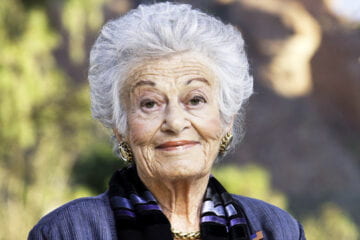
When Holocaust survivor Gerda Weissmann Klein received the 2010 Presidential Medal of Freedom from President Barack Obama, he said of her: “As an author, a historian and a crusader for tolerance, she has taught the world that it is often in our most hopeless moments that we discover the extent of our strength and the depth of our love.”
Mrs. Klein never lost hope despite enduring unimaginable atrocities during six years under Nazi rule. She has dedicated her life to fighting racism and intolerance and promoting Holocaust education and human rights.
In 1939, 15-year-old Gerda’s life changed forever as German troops invaded her home in Bielsko, Poland. After being forced to live in the basement of her childhood home for nearly three years, she was separated from her parents, never to see them or her brother again.
The next three years were spent in slave-labor and concentration camps, until forced onto a 350-mile death march along with 2,000 other women who were subjected to exposure, starvation and arbitrary execution.
She was among the 120 who survived the death march and were liberated by U.S. Army soldiers on May 7, 1945. Kurt Klein, a U.S. Army intelligence officer—and himself a refugee from Nazi Germany whose parents died in Auschwitz—was the first to come upon the lone survivors at an abandoned factory in Volary, Czechoslovakia, and found the 68-pound Gerda, one day shy of 21 years old, leaning against the wall outside.
More on Gerda Weissman Klein
• Founder, Citizenship Counts
• Received Presidential Medal of Freedom from The Obama White House
• Listed in The Encyclopedia of Jewish Women
• Subject of Best Documentary Short Subject “One Survivor Remembers,” 68th Annual Academy Awards
Their love story began at that moment and Gerda and Kurt were engaged by September 1945, married in Paris on June 18, 1946, and settled in Buffalo, New York, where Gerda became a naturalized citizen in 1948. They were married for 56 years, until his death in 2002.
The story of their meeting and life together has been featured on 60 Minutes, CBS Sunday Morning and Oprah. A book of their letters, The Hours After, is a collection of their correspondence following the war.
Mrs. Klein’s memoir, All But My Life, has been in print since 1957 and is used in high schools and colleges around the world. It served as the basis for the film One Survivor Remembers, which received an Academy Award and Emmy Award and was selected by the Library of Congress to be entered into the National Film Registry for its “important cultural, artistic and historic achievements in filmmaking.”
The Kleins’ story is portrayed in the permanent exhibit at the U.S. Holocaust Memorial Museum in Washington, D.C. In 1997, President Bill Clinton appointed Mrs. Klein to the museum’s Governing Council.
In addition to All But My Life, Mrs. Klein has written A Passion for Sharing, a biography of philanthropist and civil rights champion Edith Rosenwald Stern, which garnered Mrs. Klein the Valley Forge Freedom Award. She has authored numerous children’s books, including The Blue Rose, the story of a developmentally disabled child; Wings of EPOH, about a boy with autism; Promise of a New Spring, which gently teaches young children about the Holocaust; and One Raspberry, dedicated to her friend Ilse Kleinzahler, who died in her arms one week before Gerda was liberated.
For many years Gerda wrote a fun-filled weekly column, “Stories for Young Readers,” in The Buffalo News. She also wrote the book The Windsor Caper, a whimsical story of two young girls who spend a night in Windsor Castle where they meet historical figures and solve an art theft.
In 2008, Mrs. Klein founded Citizenship Counts, a national nonprofit whose mission is to educate middle and high school students on the tenets of citizenship, encourage them to appreciate their rights and responsibilities as Americans, and give them an opportunity to celebrate citizenship by engaging in or hosting a naturalization ceremony.
In the 1990s, Gerda and Kurt established a nonprofit devoted to combating hunger and prejudice and, with the Southern Poverty Law Center, developed a school curriculum titled “Teaching Tolerance.”
In addition to the Presidential Medal of Freedom, Mrs. Klein received the U.S. Citizenship and Immigration Services’ Outstanding American by Choice recognition and the Ellis Island Medal of Honor, among many other awards. She has traveled throughout the United States and the world sharing her message of hope.
Mrs. Klein, now 97, lives in Phoenix and has three children, eight grandchildren and 18 great-grandchildren.